What Is Your iCloud Is Being Hacked Mac?
The message “Your iCloud Is Being Hacked” appears on Mac browsers as a web page, preventing closure and constituting a scam. The objective is to persuade you that your Mac is in danger, prompting a call to a fake tech support number. These pages often arise from browser redirects, potentially caused by adware or other malware on your Mac. Unwanted programs like adware generate ads that can lead to such scams or suspicious websites.
To remove “Your iCloud Is Being Hacked,” follow the guide provided below.
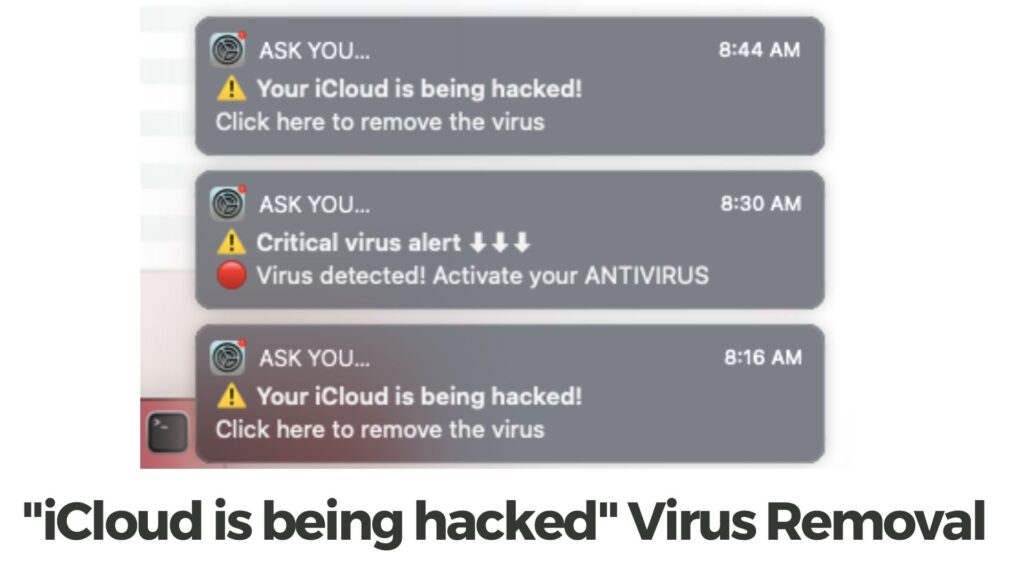
Your iCloud Is Being Hacked Mac Details
| Name | Your iCloud Is Being Hacked |
| Type | Mac Scam / Unwanted Software |
| Removal Time | Less than 15 Minutes |
| Detection Tool |
See If Your macOS Has Been Affected by Your iCloud Is Being Hacked
Download
Malware Removal Tool
|
How Did I Get It?
This pop-up is typically associated with a type of malicious software or deceptive tactics called ASK YOU. This malware is designed to frighten users into thinking their computer or account is in danger, prompting them to take an action such as calling a fake support number, clicking a harmful link, or downloading software.
There are several ways this scareware might have ended up on your device:
- Visiting an infected website: Some websites contain malicious scripts that can display these types of pop-ups. Even some legitimate websites, if they have been compromised, can display such messages.
- Clicking on suspicious links: Clicking on links in suspicious emails, social media messages, or other forms of communication can trigger such pop-ups. This is a common tactic in phishing attempts.
- Adware or Potentially Unwanted Programs (PUPs): These might have been installed on your device alongside other software. Such programs often display misleading pop-ups or redirect your browser to suspicious websites.
- Malicious apps or browser extensions: Some apps or browser extensions might display such messages or redirect your browser to display them.
If you encounter such a pop-up, it’s recommended not to interact with it. Instead, close the browser tab or window. To fully address this, consider running a scan with reputable antivirus or anti-malware software for Mac to check for and remove any potentially unwanted software on your device. Make sure your software, including your web browser,
iCloud Is Being Hacked – What Does It Do?
This scam is not something that we haven’t seen before. In fact, there are many similar fake tech support scams of this type for Mac:
- (3) Viruses Has Been Detected on Your iPhone
- Your Windows is Infected With (3) Viruses Pop-up
- Your iCloud Is Being Hacked (Windows variant).
- Your OS Sierra is infected with (3) viruses!
- Your Windows Computer is Infected With (4) Viruses!
All of these pages have something in common is that they want you either to call scammers’ fake tech support numbers or download a rogue security program. Such rogue programs are fake optimisers or Mac antivirus apps. These fake apps pretend that there are hundreds of detected viruses on your Mac, while in reality there may be not even one. The only idea is to scare you off into either paying the scammers money over the phone or buy the license for the hoax antivirus tool. Both of these cost hundreds of dollars and by paying, you expose your financial information to people with a criminal background.
Is It a Virus?
In case you see such pages, like the Your iCloud Is Being Hacked on your Mac, this is a possible sign of having a so-called unwanted software on your computer. This includes adware or browser hijackers. Such software is typically spread by being added to your computer as an optional extra to another application you may have downloaded.
If you have adware, you may see a lot of ads from the following types, while casually browsing:
- Banners.
- Ad-supported search results.
- Highlighted text ads.
- Pop-ups.
- Browser redirects.
Is It Dangerous?
Not only this, but the Your iCloud Is Being Hacked scam may not be the only risk in case you see ads. These promotions may lead you to dangerous sites that may pose other dangers to your Mac. Such sites can be:
- Fake survey sites.
- Phishing pages, designed to steal passwords.
- Scam sites.
- Virus websites.
This is the primary reason to consider securing your Mac as fast as possible.
How to Remove Your iCloud Is Being Hacked
To eliminate the appearance of “Your iCloud Is Being Hacked” on your Mac, you need to identify and delete the software responsible for its occurrence on your computer. The key is to identify the components causing these redirects. Once identified, you can use the removal guide below to eliminate these troublesome applications. If you encounter difficulties pinpointing the source of this scam, security experts recommend downloading and running a computer scan using anti-malware software. This professional software is specifically designed to scan for and erase these unwanted programs effectively, preventing their reappearance.
Steps to Prepare Before Removal:
Before starting to follow the steps below, be advised that you should first do the following preparations:
- Backup your files in case the worst happens.
- Make sure to have a device with these instructions on standy.
- Arm yourself with patience.
- 1. Scan for Mac Malware
- 2. Uninstall Risky Apps
- 3. Clean Your Browsers
Step 1: Scan for and remove Your iCloud Is Being Hacked files from your Mac
When you are facing problems on your Mac as a result of unwanted scripts and programs such as Your iCloud Is Being Hacked, the recommended way of eliminating the threat is by using an anti-malware program. SpyHunter for Mac offers advanced security features along with other modules that will improve your Mac’s security and protect it in the future.
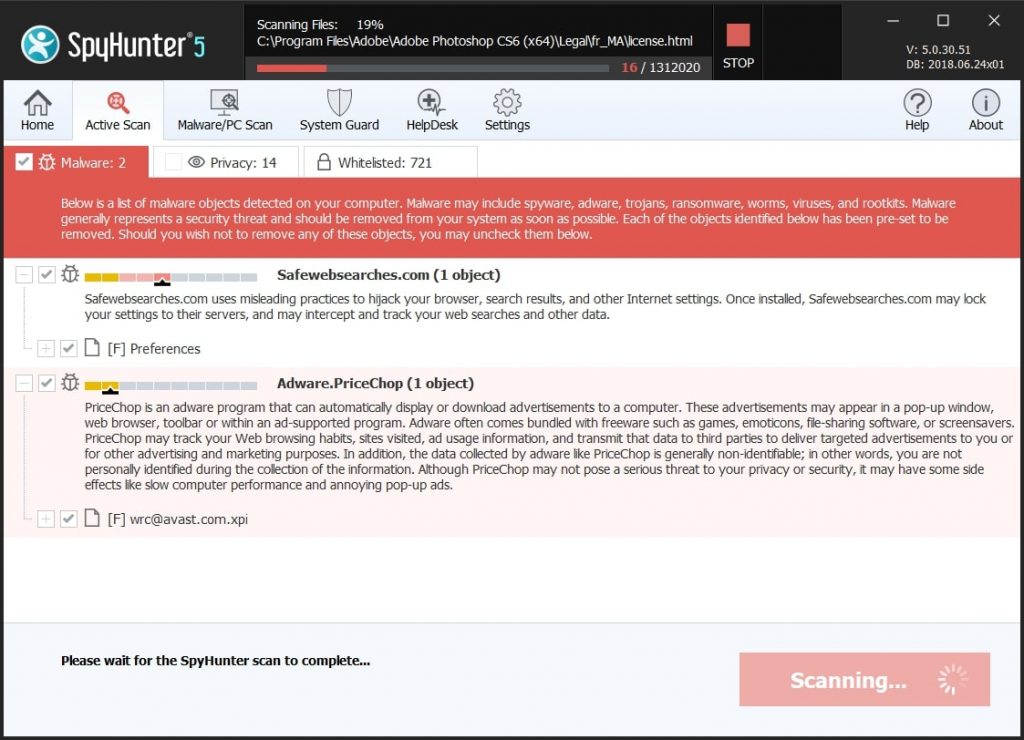
Quick and Easy Mac Malware Video Removal Guide
Bonus Step: How to Make Your Mac Run Faster?
Mac machines maintain probably the fastest operating system out there. Still, Macs do become slow and sluggish sometimes. The video guide below examines all of the possible problems that may lead to your Mac being slower than usual as well as all of the steps that can help you to speed up your Mac.
Step 2: Uninstall Your iCloud Is Being Hacked and remove related files and objects
1. Hit the ⇧+⌘+U keys to open Utilities. Another way is to click on “Go” and then click “Utilities”, like the image below shows:
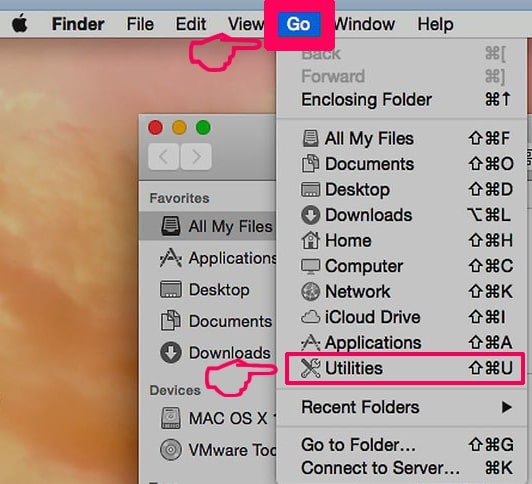
2. Find Activity Monitor and double-click it:
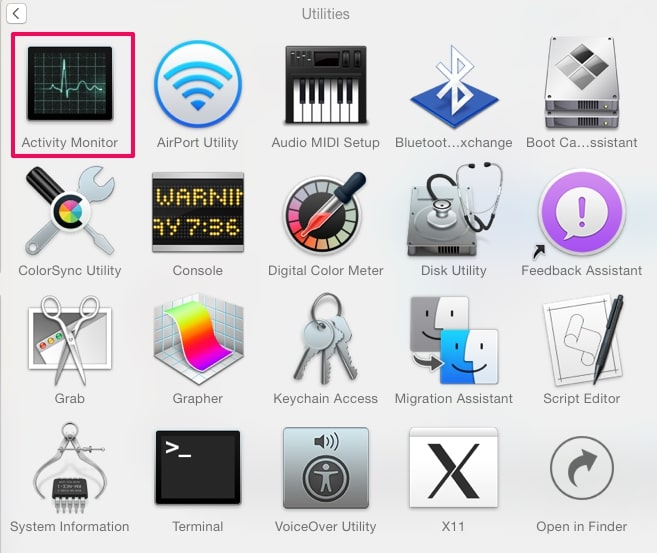
3. In the Activity Monitor look for any suspicious processes, belonging or related to Your iCloud Is Being Hacked:
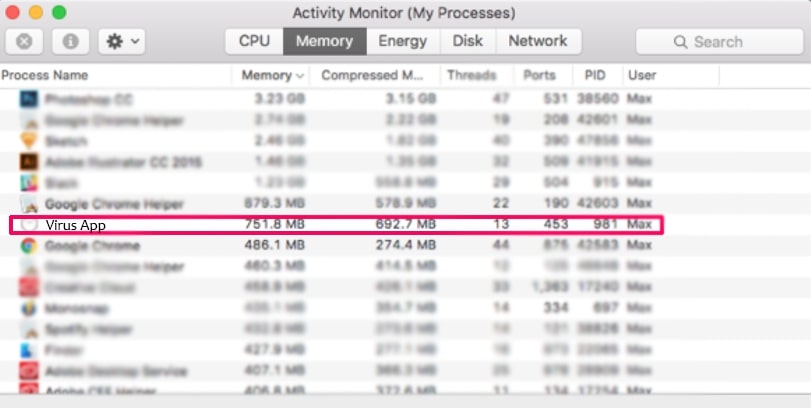
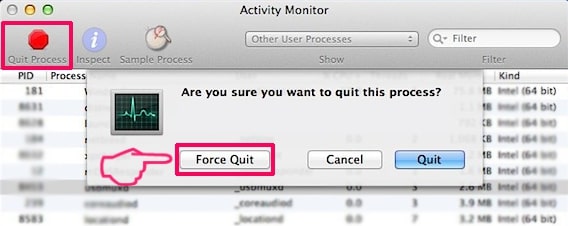
4. Click on the "Go" button again, but this time select Applications. Another way is with the ⇧+⌘+A buttons.
5. In the Applications menu, look for any suspicious app or an app with a name, similar or identical to Your iCloud Is Being Hacked. If you find it, right-click on the app and select “Move to Trash”.
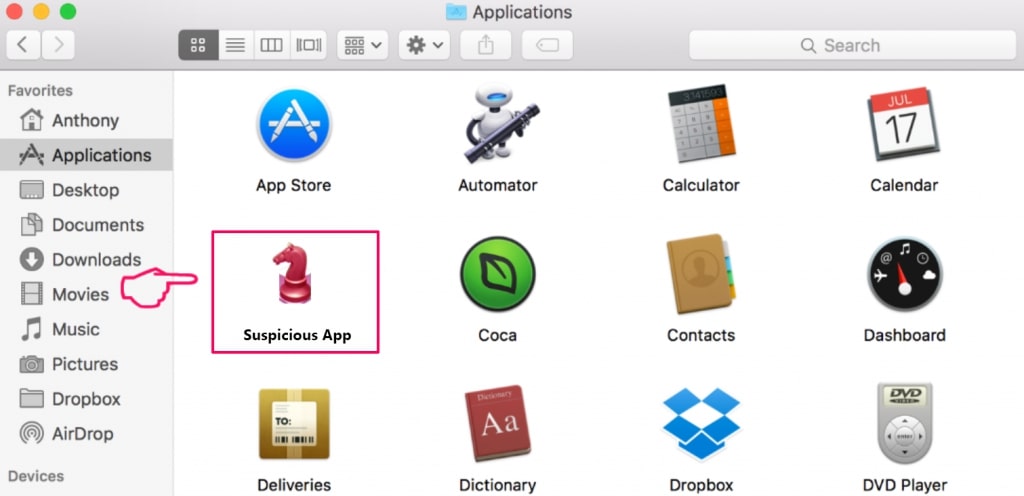
6. Select Accounts, after which click on the Login Items preference. Your Mac will then show you a list of items that start automatically when you log in. Look for any suspicious apps identical or similar to Your iCloud Is Being Hacked. Check the app you want to stop from running automatically and then select on the Minus (“-“) icon to hide it.
7. Remove any leftover files that might be related to this threat manually by following the sub-steps below:
- Go to Finder.
- In the search bar type the name of the app that you want to remove.
- Above the search bar change the two drop down menus to “System Files” and “Are Included” so that you can see all of the files associated with the application you want to remove. Bear in mind that some of the files may not be related to the app so be very careful which files you delete.
- If all of the files are related, hold the ⌘+A buttons to select them and then drive them to “Trash”.
In case you cannot remove Your iCloud Is Being Hacked via Step 1 above:
In case you cannot find the virus files and objects in your Applications or other places we have shown above, you can manually look for them in the Libraries of your Mac. But before doing this, please read the disclaimer below:
1. Click on "Go" and Then "Go to Folder" as shown underneath:
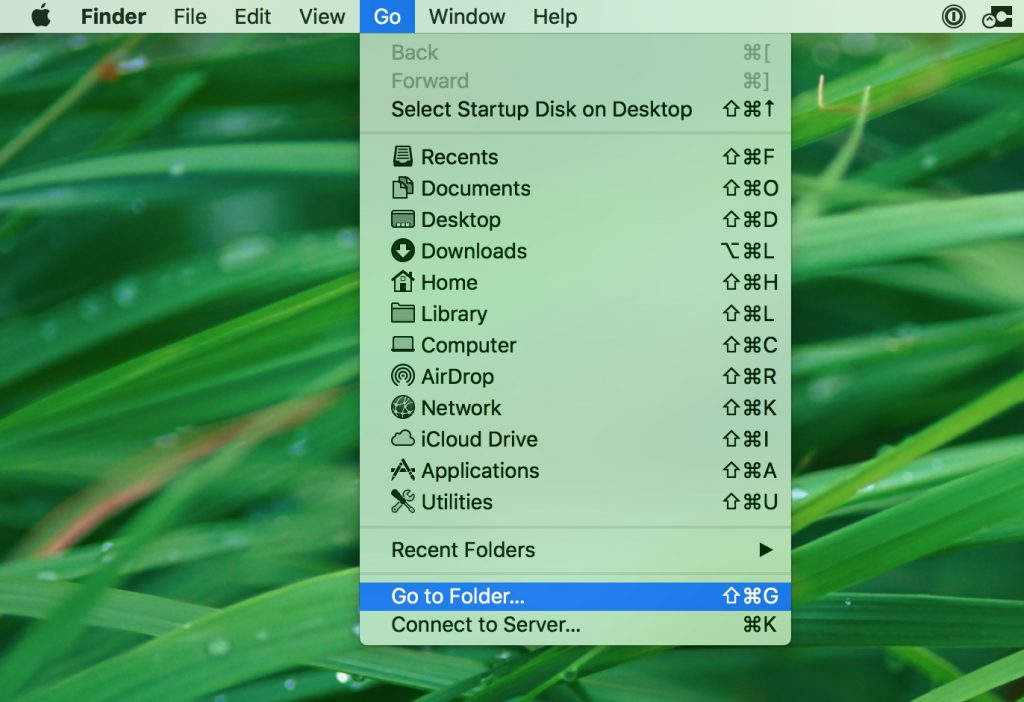
2. Type in "/Library/LauchAgents/" and click Ok:
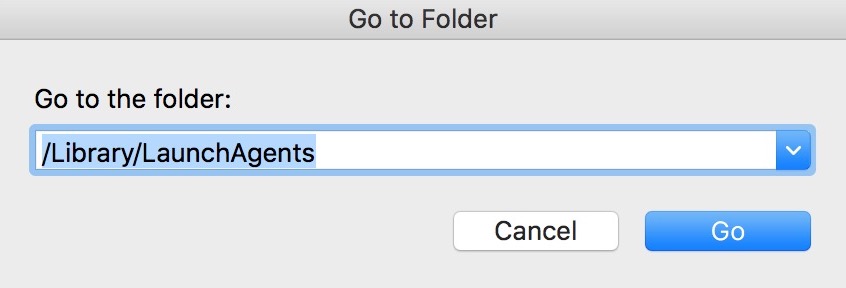
3. Delete all of the virus files that have similar or the same name as Your iCloud Is Being Hacked. If you believe there is no such file, do not delete anything.
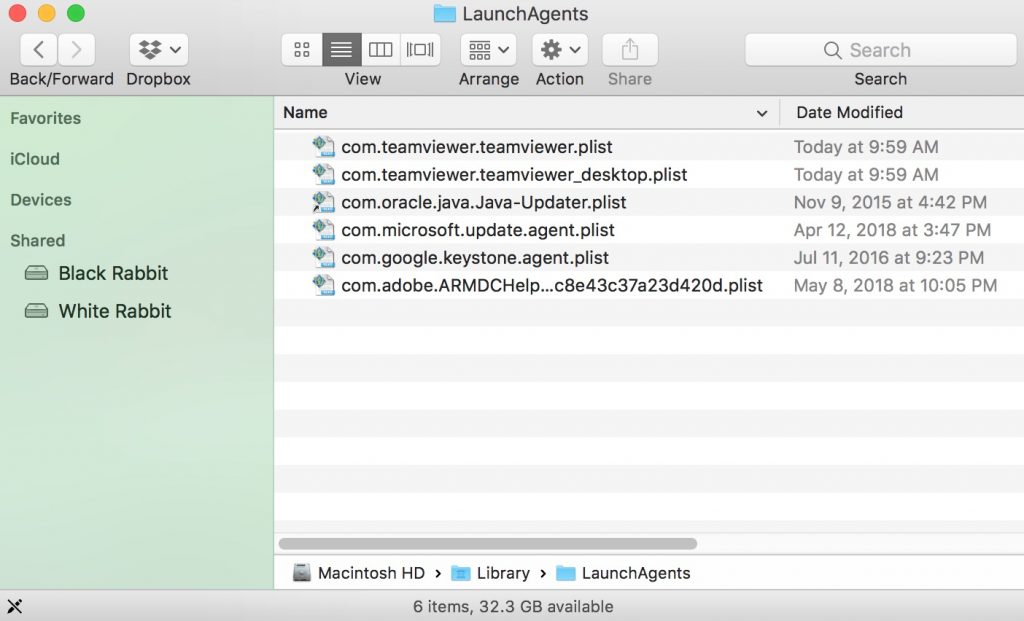
You can repeat the same procedure with the following other Library directories:
→ ~/Library/LaunchAgents
/Library/LaunchDaemons
Tip: ~ is there on purpose, because it leads to more LaunchAgents.
Step 3: Remove Your iCloud Is Being Hacked – related extensions from Safari / Chrome / Firefox
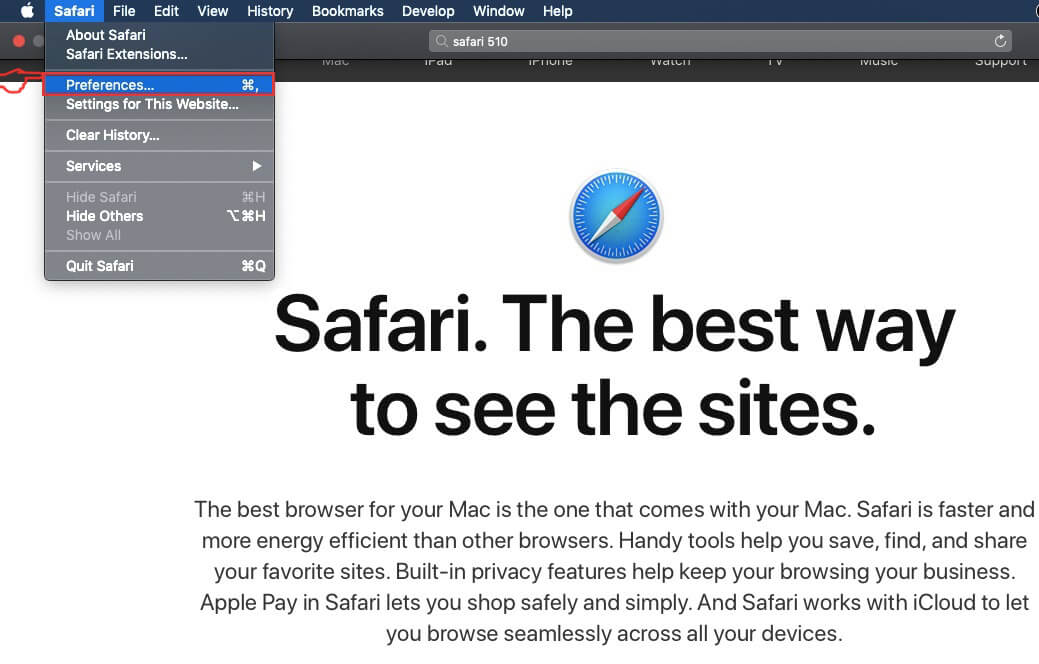

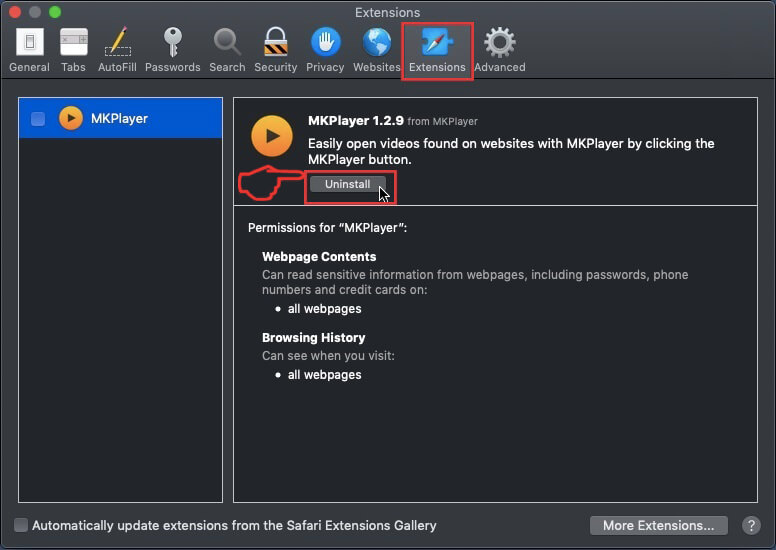
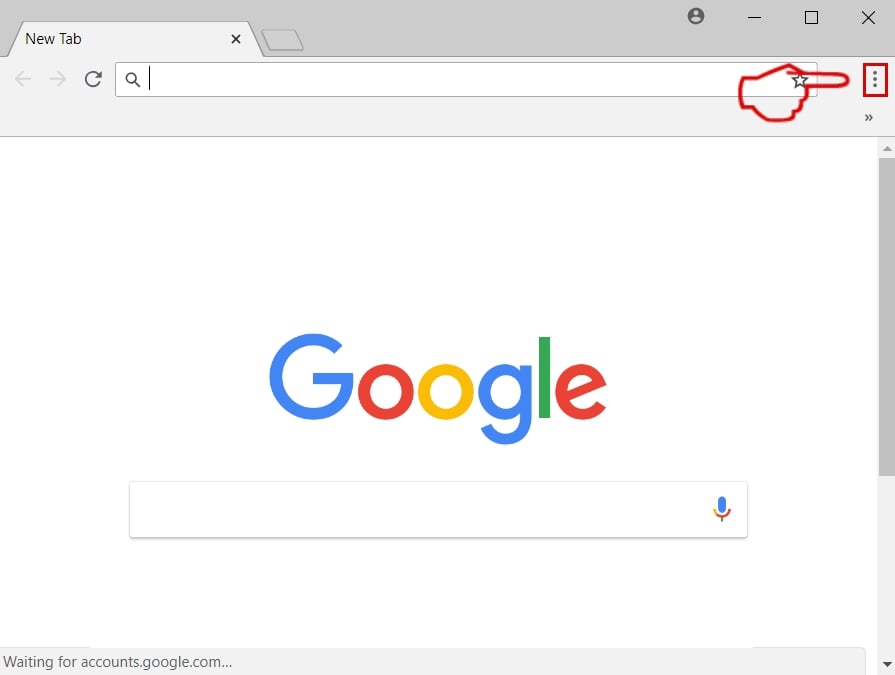
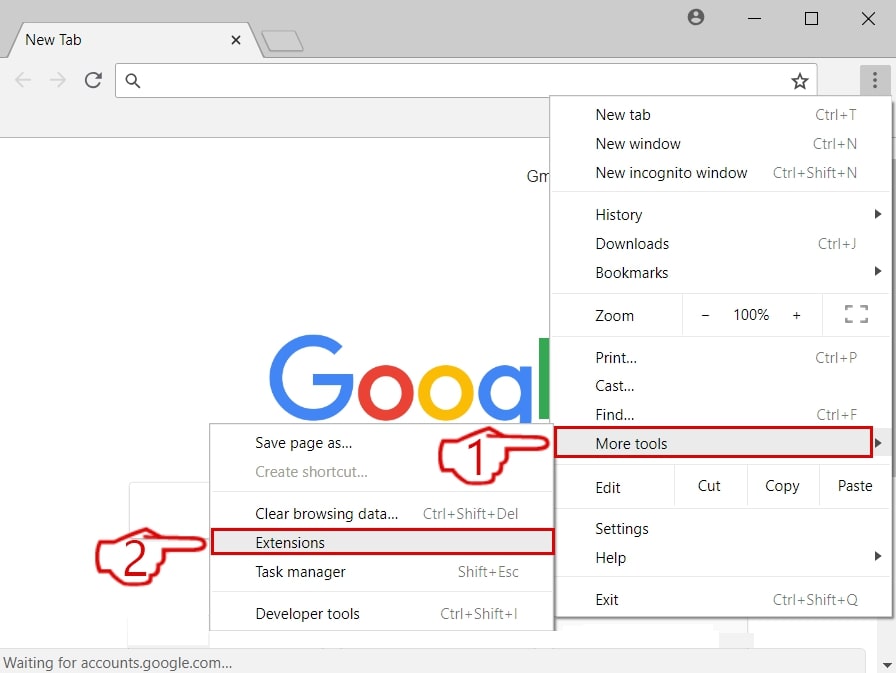
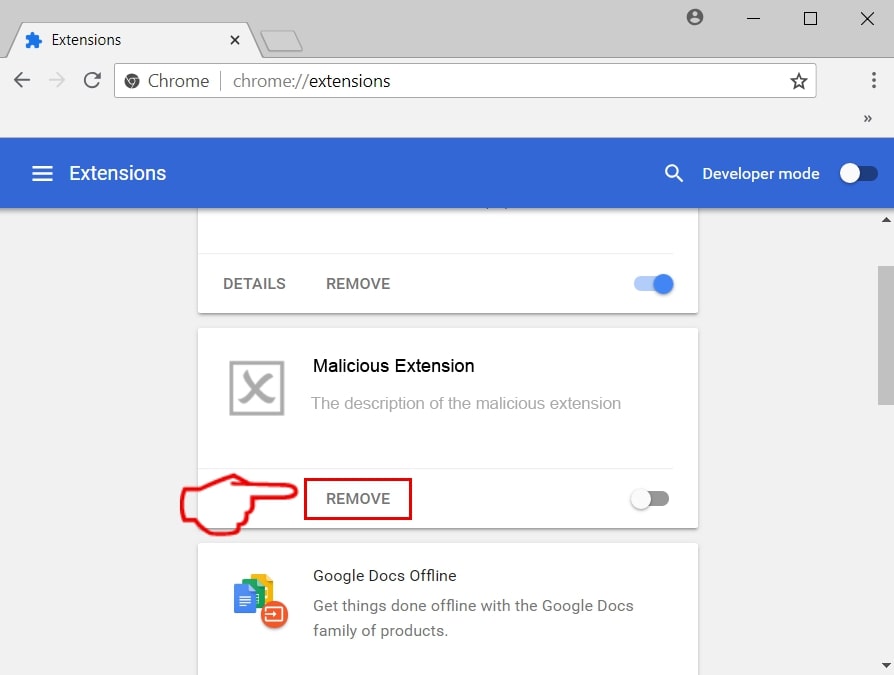
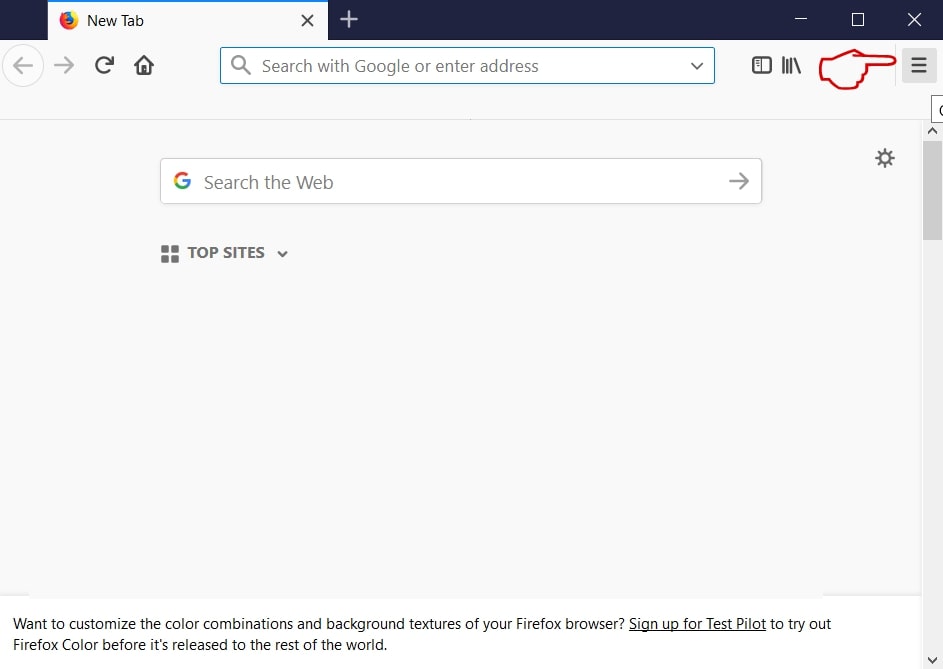
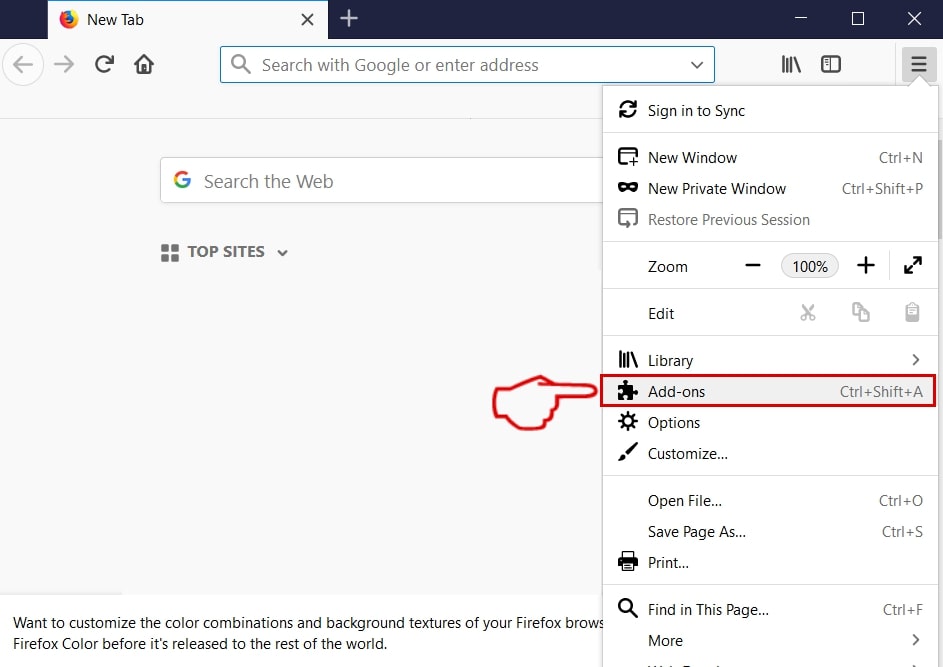
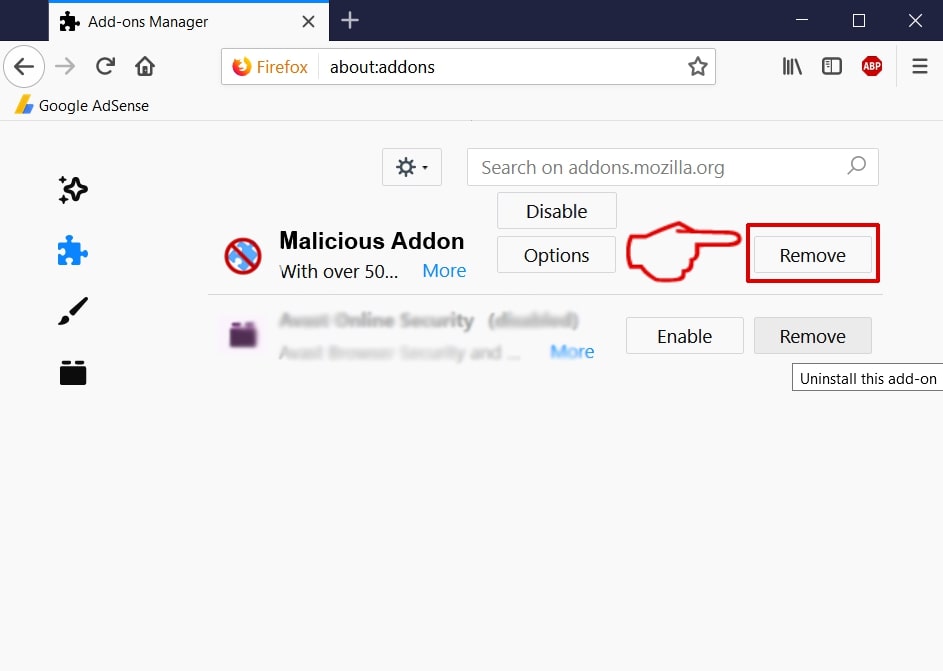
Your iCloud Is Being Hacked-FAQ
What is Your iCloud Is Being Hacked on your Mac?
The Your iCloud Is Being Hacked threat is probably a potentially unwanted app. There is also a chance it could be related to Mac malware. If so, such apps tend to slow your Mac down significantly and display advertisements. They could also use cookies and other trackers to obtain browsing information from the installed web browsers on your Mac.
Can Macs Get Viruses?
Yes. As much as any other device, Apple computers do get malware. Apple devices may not be a frequent target by malware authors, but rest assured that almost all of the Apple devices can become infected with a threat.
What Types of Mac Threats Are There?
According to most malware researchers and cyber-security experts, the types of threats that can currently infect your Mac can be rogue antivirus programs, adware or hijackers (PUPs), Trojan horses, ransomware and crypto-miner malware.
What To Do If I Have a Mac Virus, Like Your iCloud Is Being Hacked?
Do not panic! You can easily get rid of most Mac threats by firstly isolating them and then removing them. One recommended way to do that is by using a reputable malware removal software that can take care of the removal automatically for you.
There are many Mac anti-malware apps out there that you can choose from. SpyHunter for Mac is one of the reccomended Mac anti-malware apps, that can scan for free and detect any viruses. This saves time for manual removal that you would otherwise have to do.
How to Secure My Data from Your iCloud Is Being Hacked?
With few simple actions. First and foremost, it is imperative that you follow these steps:
Step 1: Find a safe computer and connect it to another network, not the one that your Mac was infected in.
Step 2: Change all of your passwords, starting from your e-mail passwords.
Step 3: Enable two-factor authentication for protection of your important accounts.
Step 4: Call your bank to change your credit card details (secret code, etc.) if you have saved your credit card for online shopping or have done online activiites with your card.
Step 5: Make sure to call your ISP (Internet provider or carrier) and ask them to change your IP address.
Step 6: Change your Wi-Fi password.
Step 7: (Optional): Make sure to scan all of the devices connected to your network for viruses and repeat these steps for them if they are affected.
Step 8: Install anti-malware software with real-time protection on every device you have.
Step 9: Try not to download software from sites you know nothing about and stay away from low-reputation websites in general.
If you follow these reccomendations, your network and Apple devices will become significantly more safe against any threats or information invasive software and be virus free and protected in the future too.
More tips you can find on our MacOS Virus section, where you can also ask any questions and comment about your Mac problems.
About the Your iCloud Is Being Hacked Research
The content we publish on SensorsTechForum.com, this Your iCloud Is Being Hacked how-to removal guide included, is the outcome of extensive research, hard work and our team’s devotion to help you remove the specific macOS issue.
How did we conduct the research on Your iCloud Is Being Hacked?
Please note that our research is based on an independent investigation. We are in contact with independent security researchers, thanks to which we receive daily updates on the latest malware definitions, including the various types of Mac threats, especially adware and potentially unwanted apps (PUAs).
Furthermore, the research behind the Your iCloud Is Being Hacked threat is backed with VirusTotal.
To better understand the threat posed by Mac malware, please refer to the following articles which provide knowledgeable details.


